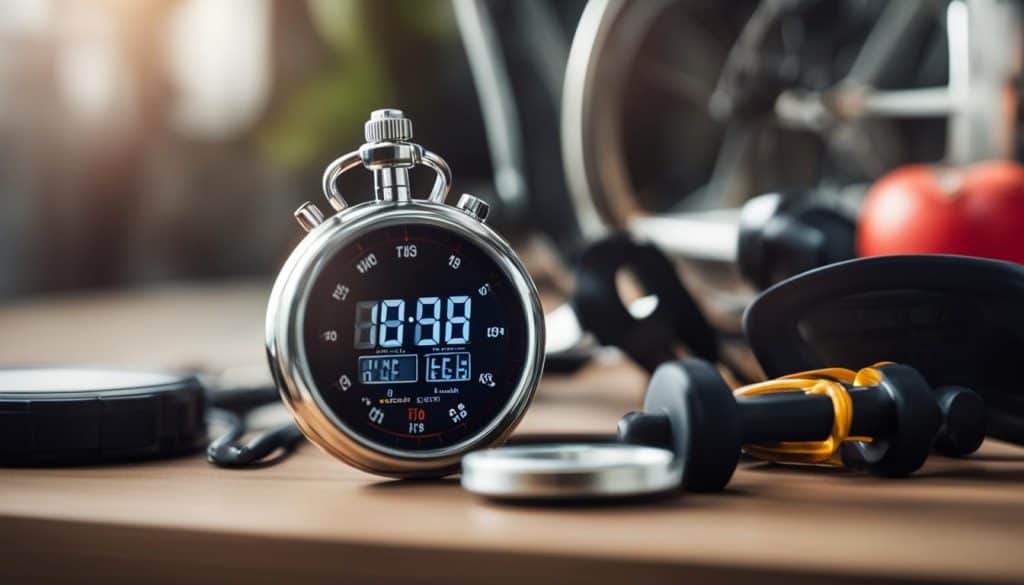Gearing up for an intense workout? You’re probably looking for that boost to power through your training session. That’s where pre-workout supplements come in, engineered to provide an extra edge by enhancing energy, endurance, and focus. But how long does it take for these supplements to kick in and start working their magic?
When we talk about the “kick-in” time of pre-workout formulas, we’re referring to the duration it takes for the effects to become apparent after ingestion. The exact timing can vary depending on various factors, notably the ingredients in the pre-workout and how your body processes them.
For most pre-workout supplements, especially those containing caffeine, you can expect the effects to kick in within 15-30 minutes after consumption. However, it’s worth noting that if you take your pre-workout after a meal, the effects may be slightly delayed.
Non-stimulant ingredients like beta-alanine, taurine, betaine anhydrous, and L-citrulline tend to have more predictable absorption and onset times compared to caffeine. So, you might experience their effects sooner than those of caffeine-based pre-workouts.
Key Takeaways:
- Pre-workout supplements have a kick-in time, referring to the duration for the effects to become apparent after ingestion.
- Most pre-workouts, particularly those with caffeine, take around 15-30 minutes to kick in.
- Consuming pre-workout on an empty stomach may lead to faster absorption and onset of effects.
- Non-stimulant ingredients like beta-alanine and citrulline tend to have more consistent absorption and metabolic rates.
- Individual differences, such as metabolism and caffeine sensitivity, can impact the kick-in time of pre-workout supplements.
Factors Affecting Pre-Workout “Kick-In Time”
Several factors influence the time it takes for pre-workout to kick in. Individual metabolism, caffeine sensitivity, body size, and fasting can significantly affect the onset speed of pre-workout effects.
Individual Metabolism
Each person’s metabolism is unique, and that plays a crucial role in determining how quickly pre-workout takes effect. Metabolism refers to the body’s ability to process and absorb nutrients and substances, such as caffeine, present in pre-workout supplements. Genetic variations in caffeine metabolism enzymes can influence the speed at which the body processes these ingredients, affecting how quickly the effects are felt.
Caffeine Sensitivity
Caffeine sensitivity also impacts the kick-in time of pre-workout. Some individuals have a higher sensitivity to caffeine, meaning they may experience its effects more quickly and intensely. On the other hand, those with lower sensitivity might require a higher dose to achieve the desired effects. It’s essential to be aware of your caffeine sensitivity and adjust your pre-workout dosage accordingly.
Body Size
Body size can also affect how quickly pre-workout kicks in. Generally, individuals with a larger body size might require a higher dose of pre-workout to experience the same effects as someone with a smaller body size. This is because a larger body typically has more body mass to distribute the supplement, potentially delaying its onset.
Fasting
Whether or not you have eaten before taking pre-workout can influence its effectiveness timeline. Consuming pre-workout on an empty stomach can lead to faster absorption and onset of effects, as there’s no food in the digestive system that could potentially slow down absorption. However, fasting for an extended period may cause discomfort for some individuals due to potential stomach irritation. If you’re sensitive to taking pre-workout on an empty stomach, consider having a light, easily digestible snack before consuming it.

Understanding these factors can help you anticipate how long it may take for pre-workout to take effect and optimize your supplementation for maximum performance during workouts. Keep in mind that everyone is different, and it may require some experimentation to find the optimal dosage and timing for your body.
Individual Metabolism and Pre-Workout Timing
When it comes to determining the kick-in time of pre-workout supplements, individual metabolism plays a crucial role. The rate at which caffeine is absorbed and eliminated in the body can vary based on various genetic and lifestyle factors. These factors include CYP1A2 enzyme variants, smoking, age, sex, race/ethnicity, body size, and total caffeine intake.
Non-stimulant ingredients found in pre-workout supplements, such as beta-alanine and citrulline, tend to have more consistent absorption and metabolic rates compared to caffeine. This means that the effects of these ingredients may be more predictable in terms of their onset time.
Due to the unique nature of individual metabolism, finding the optimal pre-workout dosing regimen may require some experimentation. What works for one person may not work for another. It’s essential to be patient and adjust the timing and dosage of your pre-workout supplementation to suit your specific metabolism and goals.
Caffeine Sensitivity and Tolerance
When it comes to taking pre-workout supplements, caffeine sensitivity and tolerance are crucial factors to consider. Understanding how quickly pre-workout works and your individual caffeine sensitivity can help optimize your workout performance.
For individuals who regularly consume caffeine, their tolerance may increase over time. This means that higher doses of pre-workout may be required to achieve the desired effects. On the other hand, individuals with low caffeine tolerance should start with a modest dose and gradually increase as needed. Finding the right balance is important to avoid potential side effects such as jitters, anxiety, and sleep disturbances.
Monitoring your caffeine intake is essential. Excessive consumption can lead to negative effects on both your physical and mental well-being. It’s important to understand your body’s response to caffeine and adjust your pre-workout dosage accordingly.
“Knowing your caffeine sensitivity and tolerance can help you tailor your pre-workout supplementation to suit your individual needs and goals.”
Caffeine sensitivity is highly individual and can vary from person to person. Factors such as genetics, body weight, and overall health can influence how quickly your body responds to caffeine. It is recommended to start with a lower dose and gradually increase until you find the optimal amount that works for you.
By being mindful of your caffeine consumption and understanding your individual tolerance, you can make the most of your pre-workout supplements without experiencing any negative effects. Remember, everyone is unique, and what works for one person may not work the same for another.

Meal Timing and Pre-Workout Absorption
When it comes to maximizing the effects of your pre-workout supplement, meal timing plays a crucial role. The timing of your pre-workout consumption can influence the onset of its effects, allowing you to optimize your performance during workouts.
Taking pre-workout on an empty stomach can result in faster absorption of its key ingredients. This can be beneficial for individuals seeking quicker onset of the pre-workout effects. However, it’s important to note that consuming pre-workout on an empty stomach may cause discomfort for some individuals due to potential irritation of the gastrointestinal tract.
To balance the benefits of faster absorption while minimizing gastrointestinal discomfort, it is recommended to consume a light and easily digestible snack before taking your pre-workout. This approach ensures that you have some food in your system to provide sustained energy during your workout, without compromising the speed of absorption.
Additionally, it is crucial to be aware of potential food-drug interactions that can affect the metabolism and response to caffeine in pre-workout supplements. Certain foods and beverages can interact with caffeine, either enhancing or inhibiting its effects. It’s important to consult with a healthcare professional or refer to reliable resources regarding specific food-drug interactions to ensure optimal utilization of the pre-workout supplement.
Pre-Workout Absorption Optimization Tips:
- Consume pre-workout on an empty stomach for faster absorption, if tolerated.
- If pre-workout on an empty stomach causes discomfort, have a light and easily digestible snack before consuming it.
- Be aware of potential food-drug interactions that can affect caffeine metabolism and response.
| Food Category | Potential Interaction with Caffeine |
|---|---|
| High-Fat Foods | May delay the absorption of caffeine, resulting in a slower onset of its effects. |
| Acidic Foods and Beverages | May enhance the effects of caffeine by increasing its absorption. |
| Protein-Rich Foods | May slow down the absorption of caffeine, leading to a delayed onset of its effects. |
| Fiber-Rich Foods | May delay the absorption of caffeine, resulting in a slower onset of its effects. |
| Alcohol | May intensify the effects of caffeine and increase the risk of adverse reactions. |
Conclusion
In conclusion, the kick-in time of pre-workout supplements can vary depending on several individual factors. Factors such as metabolism, caffeine sensitivity, meal timing, and the specific ingredients in the supplement can all play a role in how quickly the effects of pre-workout are felt. Understanding these factors is key to optimizing pre-workout intake for enhanced performance during workouts.
It is always recommended to consult with a healthcare professional before starting any new supplement regimen. They can provide personalized advice based on your specific needs and help you determine the appropriate dosage of pre-workout. Starting with a lower dose is also advisable, as it allows you to gauge your individual tolerance and minimize potential side effects.
Experimenting with different dosing regimens and forms of pre-workout can also be beneficial. Not all pre-workout supplements are created equal, and everyone’s body may respond differently to different formulations. By trying out different combinations, you can find the optimal pre-workout regimen that works best for your unique needs.
FAQ
How long does it take for pre-workout to kick in?
The effects of pre-workout, especially those with caffeine, typically kick in within 15-30 minutes. However, the onset may be slightly delayed if consumed after a meal.
What factors affect the kick-in time of pre-workout?
Several factors can influence the time it takes for pre-workout to kick in, including individual metabolism, caffeine sensitivity, body size, and fasting.
How does individual metabolism affect pre-workout timing?
Each person’s metabolism is unique, and factors such as caffeine tolerance and genetic variations in caffeine metabolism enzymes can affect how quickly the body processes pre-workout ingredients. Consuming pre-workout on an empty stomach may lead to faster absorption and onset of effects.
What should I consider regarding caffeine sensitivity and tolerance?
Caffeine sensitivity and tolerance play a role in pre-workout timing. Habitual caffeine consumption can lead to increased tolerance, requiring higher doses of pre-workout. It is important to start with a modest dose and gradually increase as needed while monitoring caffeine intake to avoid potential side effects.
How does meal timing affect pre-workout absorption?
Taking pre-workout on an empty stomach can lead to faster absorption, but it may cause discomfort for some individuals. Consuming a light, easily digestible snack before taking pre-workout can balance faster absorption while minimizing gastrointestinal discomfort.
Are there any food-drug interactions to be aware of?
Yes, certain food-drug interactions can influence caffeine metabolism and response. It is essential to be aware of potential interactions and consult with a healthcare professional if necessary.
Source Links
- https://fitnessproject.us/blog/how-long-does-it-take-for-pre-workout-to-kick-in/
- https://www.transparentlabs.com/blogs/all/how-long-does-pre-workout-take-to-kick-in
- https://steelsupplements.com/blogs/steel-blog/how-long-does-it-take-for-pre-workout-to-kick-in
Hey there, I’m Luke, and I’ve been immersed in the fitness world since 2007. From gym floors to running my own personal training business, I’ve seen it all. My journey led me to study Sports Science at university, where I deepened my understanding of the science behind exercise.
One thing that truly lights my fire? High-Intensity Interval Training (HIIT). It’s not just a workout; it’s a game-changer. I’ve used HIIT to help countless men and women shed weight and transform their lives for the better.
Through my personal training business, I’ve witnessed the incredible impact of HIIT on both physical and mental well-being. It’s not just about getting fitter; it’s about feeling stronger, more confident, and more resilient.
Join me on this journey to a healthier, happier you. Let’s crush those goals together!